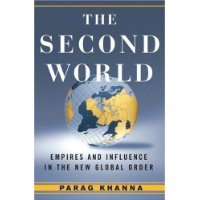| 商家名称 |
信用等级 |
购买信息 |
订购本书 |
|
|
 |
The Second World: Empires and Influence in the New Global Order |
 |
|
 |
The Second World: Empires and Influence in the New Global Order |
 |

基本信息·出版社:Random House
·页码:496 页
·出版日期:2008年03月
·ISBN:1400065089
·条形码:9781400065080
·装帧:精装
·正文语种:英语
·外文书名:第二世界: 新全球秩序中的帝权和影响力
内容简介 Grand explanations of how to understand the complex twenty-first-century world have all fallen short–until now. In
The Second World, the brilliant young scholar Parag Khanna takes readers on a thrilling global tour, one that shows how America’s dominant moment has been suddenly replaced by a geopolitical marketplace wherein the European Union and China compete with the United States to shape world order on their own terms.
This contest is hottest and most decisive in the Second World: pivotal regions in Eastern Europe, Central Asia, Latin America, the Middle East, and East Asia. Khanna explores the evolution of geopolitics through the recent histories of such underreported, fascinating, and complicated countries as Azerbaijan, Uzbekistan, Colombia, Libya, Vietnam, and Malaysia–nations whose resources will ultimately determine the fate of the three superpowers, but whose futures are perennially uncertain as they struggle to rise into the first world or avoid falling into the third.
Informed, witty, and armed with a traveler’s intuition for blending into diverse cultures, Khanna mixes copious research with deep reportage to remake the map of the world. He depicts second-world societies from the inside out, observing how globalization divides them into winners and losers along political, economic, and cultural lines–and shows how China, Europe, and America use their unique imperial gravities to pull the second-world countries into their orbits. Along the way, Khanna also explains how Arabism and Islamism compete for the Arab soul, reveals how Iran and Saudi Arabia play the superpowers against one another, unmasks Singapore’s inspirational role in East Asia, and psychoanalyzes the second-world leaders whose decisions are reshaping the balance of power. He captures the most elusive formula in international affairs: how to think like a country.
In the twenty-first century, globalization is the main battlefield of geopolitics, and America itself runs the risk of descending into the second world if it does not renew itself and redefine its role in the world.
Comparable in scope and boldness to Francis Fukuyama’s
The End of History and the Last Man and Samuel P. Huntington’s
The Clash of Civilizations and the Remaking of World Order, Parag Khanna’s
The Second World will be the definitive guide to world politics for years to come.
“A savvy, streetwise primer on dozens of individual countries that adds up to a coherent theory of global politics.”
–Robert D. Kaplan, author of
Eastward to Tartary and
Warrior Politics“A panoramic overview that boldly addresses the dilemmas of the world that our next president will confront.”
–Dr. Zbigniew Brzezinski, former national security advisor
"Parag Khanna's fascinating book takes us on an epic journey around the multipolar world, elegantly combining historical analysis, political theory, and eye-witness reports to shed light on the battle for primacy between the world's new empires."
–Mark Leonard, Executive Director, European Council on Foreign Relations
"Khanna, a widely recognized expert on global politics, offers an study of the 21st century's emerging "geopolitical marketplace" dominated by three "first world" superpowers, the U.S., Europe and China... The final pages of his book warn eloquently of the risks of imperial overstretch combined with declining economic dominance and deteriorating quality of life. By themselves those pages are worth the price of a book that from beginning to end inspires reflection."
–Publishers Weekly 作者简介 Parag Khanna directs the Global Governance Initiative in the American Strategy Program of the New America Foundation. He has been a fellow at the Brookings Institution and worked for the World Economic Forum and the Council on Foreign Relations. During 2007, he was a senior geopolitical advisor to U.S. Special Operations Command. Born in India, Khanna was raised in the United Arab Emirates, the United States, and Germany. He holds undergraduate and graduate degrees from the School of Foreign Service at Georgetown University and is completing his Ph.D. at the London School of Economics. He has written for major global publications such as
The New York Times and
Financial Times and appeared on CNN and other television media around the world. Having traveled in close to one hundred countries. He is a member of the Explorers Club.
专业书评 From Publishers Weekly Khanna, a widely recognized expert on global politics, offers an study of the 21st century's emerging geopolitical marketplace dominated by three first world superpowers, the U.S., Europe and China. Each competes to lead the new century, pursuing that goal in the third world: select eastern European countries, east and central Asia, the Middle East Latin America, and North Africa. The U.S. offers military protection and aid. Europe offers deep reform and economic association. China offers full-service, condition-free relationships. Each can be appealing; none has obvious advantages. The key to Khanna's analysis, however, is his depiction of a second world: countries in transition. They range in size and population from heavily peopled states like Brazil and Indonesia to smaller ones such as Malaysia. Khanna interprets the coming years as being shaped by the race to win the second world—and in the case of the U.S., to avoid becoming a second-world country itself. The final pages of his book warn eloquently of the risks of imperial overstretch combined with declining economic dominance and deteriorating quality of life. By themselves those pages are worth the price of a book that from beginning to end inspires reflection.
(Mar. 11) Copyright © Reed Business Information, a division of Reed Elsevier Inc. All rights reserved.




